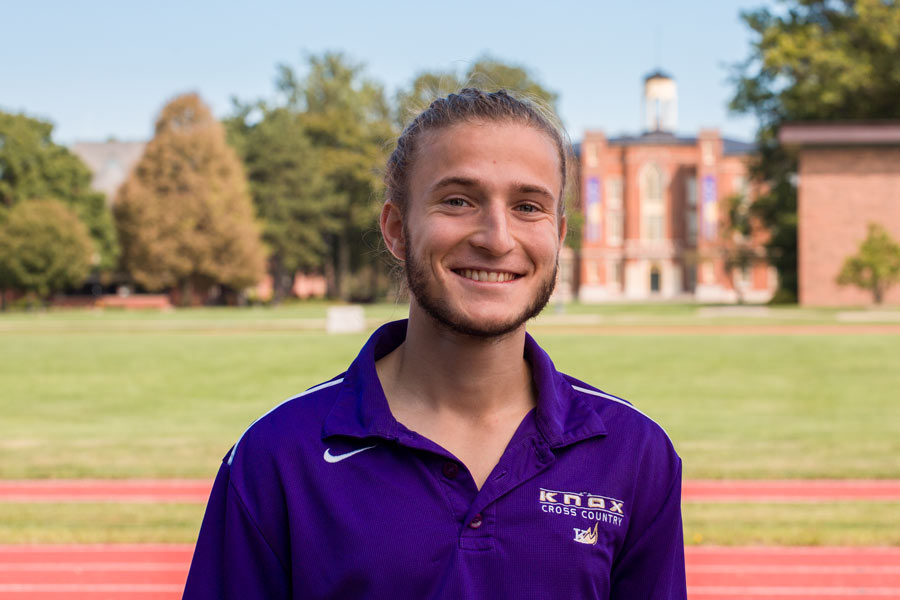


2021 Pushcart Prize Winner
Majored in Creative Writing; Minored in Religious Studies

Josh Tvrdy '17 recently was awarded a 2021 Pushcart Prize, one of the most prestigious awards in contemporary American writing, for his poem “The Out-&-Proud Boy Passes the Baseball Boy.”
Who were your greatest influences at Knox?
Gina Franco, Monica Berlin, and Nicholas Regiacorte [faculty members in English literature and creative writing]. They were all so influential to me in different ways. I think Knox has an unprecedentedly strong poetry program, because 1) they're all pedagogically strong professors, they care about their classes, and that is so potently felt as a student, and 2) they're great models of working poets. They all have forthcoming or published books that are doing very well. Their poems are so brilliant and so different, which shows you as a student that your poems don't have to be one thing. And I think they're different in ways that complement each other. I took workshops with all three and I feel like all three workshops sharpened different parts of my poetic sensibility and my person. I truly love the poetry program at Knox. All three of them create an environment that is so fecund for poetic growth and personal growth. I love them very much, and I miss them very much, and I'm so grateful for the work they do.
We are quite spoiled at Knox. I see that now. I think I was aware of it when I was there, but it’s a special place and a special program with an attentiveness that is not reflected in the world. It's what the world should be, or could be, but it’s rare.
What does winning a Pushcart mean to you?
Certainly accolades and prizes are not the reason I write. That wouldn’t be a way to arrive at the poems that I think need to be written. But prizes sure are encouraging when they fall into your lap like this one did. Just the encouragement that a stranger, someone who you’ve never met, resonates with your work, work that often feels extremely private, wrung from an interior life that you’re nervous about showing the world—it was just very encouraging and re-solidified the certainty that this is something I want to continue pursuing. The other overwhelming feeling: sheer gratitude. When I looked at the other 2021 Pushcart Prize winners, a few of them (specifically Ilya Kaminsky, Jane Hirshfield, Ted Kooser, and especially Frank Bidart) are truly some of my first-ever poetry crushes. People that opened the gates of poetry for me to find my own voice, to find my own language. The fact that I'm going to have a poem that's bound with poems by those people—it's humbling and it's thrilling, it's flabbergasting. It's just joyful.
What is your writing process like?
It’s not so much image or the intellectual thought of a poem which takes me to the page, though those things do emerge. It’s almost always music. It’s almost always a silly scrap of language, words that just sound nice together that I throw onto the page and start molding into something. Little slips of language that delight me. Not all of them become poems, but frequently they do.
What keeps me in the poem is the revision process. I don’t love the blank page. But I absolutely love the process of revision. When you have a draft and you can slowly start to redraft and rewrite. It's almost like the poem is sloughing old skin, like a snake, and you're suddenly seeing what actual colors are there. That's the revision process for me: as you take it through 10 drafts, 20 drafts, 30 drafts, you start to actually meet the poem, you start to actually understand what the speaker wants, what the language wants.
What lessons did you carry with you after Knox into your teaching, writing, and learning?
Learning how to read. Reading is a skill that’s developed over time and through practice, and in every Knox workshop I ever took, I was challenged to read thoughtfully. To listen and articulate what I was hearing. Now that I’m someone who occasionally conducts my own writing workshops, I always begin there: What is this poem about? How are we reading it? Because ultimately I think reading comes down to respect. It's helpful for poem-making, but it's also helpful in our interactions with other people. Learning to stay silent and just listen; exercising our muscles in empathy and compassion and imagination: it makes for great poems, but it also makes for vibrant friendships.